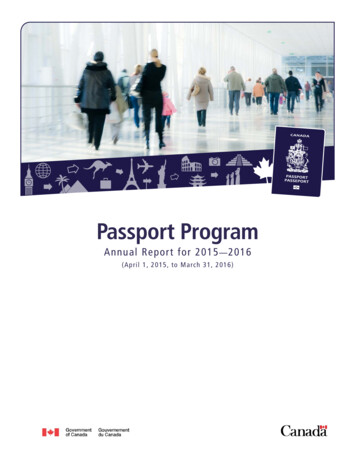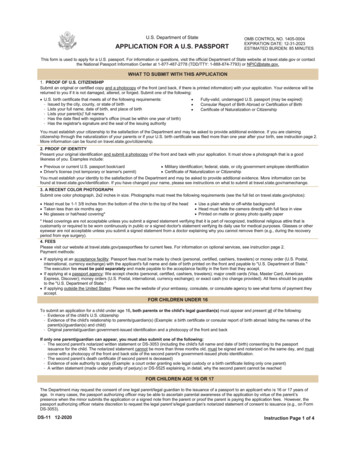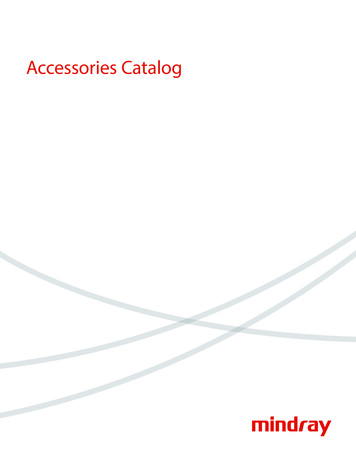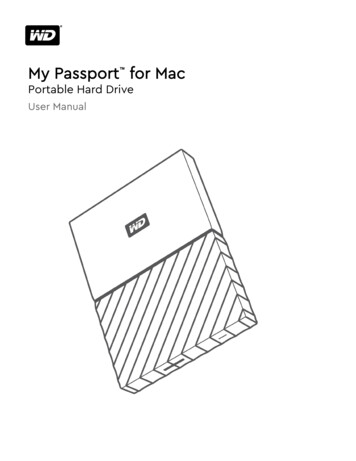
Transcription
Passport ProgramAnnual Report for 2015 — 2016(April 1, 2015, to March 31, 2016)
Publications Feedback SurveyWe invite you to provide us with your comments on this publication by completing our electronic feedback surveyat www.cic.gc.ca/publications-survey.For information about other IRCC publications, visit:www.cic.gc.ca/publications.Available in alternative formats upon request.Également disponible en français sous le titre : Rapport annuel du Programme de passeport pour 2015-2016Visit us Canada@CitImmCanada Her Majesty the Queen in Right of Canada, represented by the Minister of Immigration, Réfugees and Citizenship, 2016Cat. no. Cil-21E-PDFISSN 2371-2538C&I-2209-11-2016
ContentMessage from the Deputy Minister .5Section 1 – About the Passport Program .61.1 The Program .61.1.1 Alignment with Government Priorities .61.1.2 Passport Program Strategic Themes .61.2 Our Products .91.3 Our Fees .101.4 Our Network.111.4.1 Service Delivery Model .111.4.2 Service Delivery Network.11Section 2 – Performance Review.132.1 Processing Applications.132.1.1 Forecasts .132.1.2 Volumes .142.1.3 Service Channel Use .142.1.4 Service Standard Performance.152.2 Client Feedback .172.2.1 Key Highlights.172.3 International Partnerships .19Section 3 – Financial Performance .213.1 How Passports Are Funded.213.2 Financial Results for the 2015–2016 fiscal year.22Section 4 – Moving Forward.23Annex A – Financial Statements .24Passport ProgramA n n u a l R e p o r t f o r 2 015 — 2 0163
Passport ProgramAnnual Report for 2015-2016Message from the Deputy MinisterI am delighted to present the achievements of Canada’s Passport Program for the 2015–2016 fiscal year, duringwhich the Passport Program continued to maintain one of the highest levels of client satisfaction in the Federalservices. Specifically, our latest customer feedback survey tells us that we maintain an impressive 96 percent rate ofclient satisfaction. Our continued commitment to providing Canadians with the most responsive service possibleis demonstrated by quick turnaround times; 4.8 million passports — the fifth highest volume in the PassportProgram’s history — were processed within advertised service standards 99 percent of the time.During the 2015–2016 fiscal year, the Passport Program also continued to work on modernizing the way it doesbusiness to facilitate improvements to client service while upholding integrity. IRCC is focussed on ensuring asmooth transition to a passport issuance system across the network in the coming years and improving the overallpassport application process for Canadians.As part of enhanced security measures, in the last fiscal year, IRCC took steps to make the passport even safer byamending the legislation governing the Passport Program. New authorities aim to prevent the issuance of Canadianpassports to high-risk individuals intending to travel to carry out acts of terrorism or to commit sexual offencesagainst children abroad.In addition, IRCC worked hard to strengthen the integrity of the passport while ensuring that only eligibleCanadian citizens have access to Canadian passports. To better mitigate the risk of issuing passports to individualswho are not entitled to them or to revoke their travel documents, the Program processed over 642 000 facial recognitions alerts; analyzed and resolved over 40 000 high-risk applications; and referred 2 750 cases involving judicial mobility restrictions, passport misuse, entitlement fraud, identityfraud or national security concerns for administrative investigation.The Program continuously strives to strike the best possible balance between service excellence, strengthenedsecurity and increased operating efficiency to ensure Canadians are able to rely on their passport to facilitateinternational travel.As we move forward, we will continue to ensure Canadians receive the high level of client service and value formoney that they have come to expect from the Passport Program.I invite you to read all about last year’s accomplishments in the following pages.Marta MorganDeputy MinisterPassport ProgramA n n u a l R e p o r t f o r 2 015 — 2 0165
Section 1 – About the Passport Program1.1The ProgramCurrent Passport Program responsibilities are set out in the Canadian Passport Order and have been ineffect since July 2, 2013. Subject to the Canadian Passport Order, the Minister of Immigration, Refugees andCitizenship Canada (IRCC) is responsible for the Passport Program and has authority to work with the Ministerof Employment and Social Development Canada (ESDC) and the Minister of Global Affairs Canada (GAC) toexercise specific administrative powers. Therefore, IRCC is responsible for the issuing, revoking, withholding,recovery and use of Canadian passports; ESDC, through Service Canada, is responsible for the bulk of passportservice delivery in Canada; and GAC is responsible for passport services abroad.1The Minister of IRCC derives authorities and responsibilities for the Passport Program from the followinglegislation: Canadian Passport Order; Order Respecting the Issuance of Diplomatic and Special Passports; Financial Administration Act; and User Fees Act.1.1.1 Alignment with Government PrioritiesThe Passport Program contributes to the Government of Canada’s strategic outcome of “a safe and secure worldthrough international engagement”. Through the Passport Program2, IRCC facilitates travel for Canadians andcontributes to a safe and secure travel regime by issuing Canadian travel documents that are internationallyrecognized and respected. The Passport Program ensures that legitimate travelers are in possession of Canadiantravel documents, that potential applicants are informed and understand their responsibilities in terms of applyingfor and possessing Canadian travel documents, and that the needs of Canadian travel document holders are met.1.1.2 Passport Program Strategic ThemesDuring the 2015–2016 fiscal year, the Program established priorities and presented accomplishments and resultsunder three strategic themes: enhancing management practices, strengthening security and excellence in servicedelivery. This section presents the Program’s accomplishments and results under each of these three themes.Enhancing Management PracticesEnsuring the use of modern management practices to anticipate and respond to future needs, including capabilitiesfor strategic alignment, innovation and decision making.Strong program management ensures the Program stays abreast of changes in the operating environment byundertaking the planning, analysis, stakeholder outreach and modernization initiatives required to achieve serviceand security objectives over the long term while providing value for money for Canadians.126Prior to July 2013, the Passport Program was a special operating agency of GAC.On July 2, 2013, the responsibility of Passport Canada, a special operating agency under GAC, was transferred as a program to theMinister of IRCC.Passport ProgramA n n u a l R e p o r t f o r 2 015 — 2 016
Program management is particularly critical when working with service delivery partners (i.e., ESDC and GAC).IRCC must continuously work with its partners to strike the appropriate balance between integrity and operatingefficiency, without any service disruptions to Canadians. This year saw the following accomplishments in relationto program management: The integration of Passport Canada internal services within IRCC to optimize synergies between theProgram and the Department was finalized. This included the transfer of the Program’s Foreign Operationsgroup to the Department’s International Region Branch. This has helped strengthen the relationshipbetween IRCC and GAC and assisted in reducing any duplication of work between departments. Work continued on the modernization initiative. IRCC is working toward the launch of GCMS, a newsystem for the Passport Program, and has concluded some of its testing of the passport issuance module.Information gathered during the testing phase will assist in improving workflows and GCMS functionalityfor the Passport Program. Certificates of identity and refugee travel documents are now being issuedexclusively through GCMS.Strengthening SecurityEnsuring that the reputation of the Canadian travel document and confidence in the Passport Program are maintained.Maintaining the integrity of the Passport Program is critical. Canada’s Passport Program is an important componentof our country’s security infrastructure and helps to mitigate security threats. Research shows that when acquiring apassport, Canadians look for strong security features, recognition of the passport by foreign authorities and visa-freeaccess to other countries. All of these factors relate to integrity and depend on the Program’s capacity to enhancepassport security features, build and maintain effective partnerships, detect fraud and reduce the risk that Canadianpassports are issued to or in possession of high risk individuals.For the reporting year, business priorities were established that were mindful of an evolving environment markedby increasingly sophisticated identity theft and fraud, with more individuals seeking to fraudulently obtaingenuine passports rather than trying to tamper with existing documents. To prevent such fraud, IRCC continuedto collaborate with other government security partners to minimize these threats and strengthen Canada’s securityinfrastructure.Accomplishments in this area in the 2015–2016 fiscal year were as follows: Amendments to the Canadian Passport Order were approved on June 23, 2015, to limit access topassports for individuals considered to be at a high risk of travelling to engage in terrorism or to commitsexual offences against children abroad. Working relationships were maintained with the Canadian Security Intelligence Service, the RoyalCanadian Mounted Police (RCMP), the Canada Border Services Agency (CBSA) and Public SafetyCanada, focussing on security threats with a special emphasis on Canadians involved in foreign conflicts.This information sharing network has proven effective in the detection of fraud and will contribute tobuilding appropriate safeguards, controls and oversight mechanisms to manage the risk that a passport maybe used for the purpose of travelling to engage and participate in terrorism-related activities. The integrity and worldwide recognition of the Canadian passport were maintained by beginningwork on the development of the next generation passport booklet to ensure Canadians have one of the mostadvanced and secure passports available. Work will continue on the ePassport Next Generation Project overthe next few years with an expected implementation date for the new ePassport Solution in 2020.Passport ProgramA n n u a l R e p o r t f o r 2 015 — 2 0167
Passport Program risk assessments in the Eastern African region were completed. These riskassessments provide insight into threats and risks that may be unique to a mission or geographic area ofresponsibility, client profile, or operating environment, providing key information for missions on passportservice delivery, supporting tools and strategies. Continued improvements were made to the facial recognition program through engaging in anenhancement initiative aimed at improving fraud detection, identity management and efficiency. Businessand system requirements have been clearly defined and documented in preparation for the developmentand implementation of these enhancements. The validation identities with provinces were initiated. In the 2015–2016 fiscal year, engagement withprovinces began in order to develop automated information sharing to better validate identities prior toissuing passports. This process will also offer provinces the option to validate IRCC identity and statusinformation.Success Indicators Related to Program IntegrityAccording to the Henley & Partners Visa Restrictions Index 20153, Canada ranks fourth worldwide in terms ofvisa-free access to other countries. This high level of travel freedom is a reflection of Canada’s relationships withinthe international community and of a high regard for the Canadian passport.Given the ongoing scrutiny of the security and integrity of the Canadian passport and its issuing system, theCanadian Passport Order provides a legal basis for the Minister to refuse or revoke a passport as a result of theanalysis of high risk passport applications and investigations. In the 2015–2016 fiscal year, 4 380 passportapplications were refused for not being duly completed upon reception, whereas 209 passport applications wererefused and 892 were revoked after investigations into concerns about the person’s identity, criminality, suspectedfraudulent activity or misuse of a passport.IRCC also administers decisions on behalf of the Department of Justice under the Family Orders and AgreementsEnforcement Assistance Act (FOAEAA). Sections 69 and 70 of the FOAEAA give the Minister of IRCC theauthority to suspend or refuse to issue a passport to an individual upon being informed by the Minister ofJustice that this individual is subject to a license denial application due to child support payment arrears. In the2015–2016 fiscal year, a total of 2 820 individuals were subject to refusal or suspension of a passport pursuant toFOAEAA (737 refusals and 2 083 suspensions).Passports that are lost or stolen are also monitored for security reasons. In the 2015–2016 fiscal year, 58 535passports out of a total of 23.2 million passports in circulation were reported lost or stolen. This represents0.25 percent of all the passports in circulation during this period, down from 0.27 percent last year. Informationregarding lost and stolen passports is shared with the RCMP, CBSA and Interpol for inclusion in their respectivedatabases in order to mitigate the risk of unauthorized use of invalidated passports.Excellence in Service DeliveryEnsuring the Passport Program is responsive to high client service expectations.According to the latest client survey undertaken in 2015, Canadians continue to expect high-quality passportservices, including a straightforward passport application process and an acceptable time frame to obtain apassport. Therefore, the Passport Program continues to explore modernization options to ensure it is able to meetclients’ needs in years to come. This includes recognizing that Canadians want to access a full range of federalgovernment programs and services electronically, including passport services.38The Henley & Partners Visa Restrictions Index is a global ranking of countries according to the travel freedom that their citizensenjoy: sport ProgramA n n u a l R e p o r t f o r 2 015 — 2 016
The Passport Program has begun the development of new and modern ways of delivering the program, as follows: Service delivery for Canadians was improved with the expansion of the Service Canada Passport ServiceDelivery Network by adding nine additional Service Canada receiving agent sites, all with the capacity toperform Documentary Evidence of Citizenship (DEC) validation passport services. DEC validation allowsapplicants to keep their proof of citizenship once presented to a Service Canada agent rather than having itbe retained throughout the entire process. Processing times were improved with the implementation of certificates of identity in GCMS, allowingofficers to more easily determine a client’s entitlement to a certificate of identity or refugee travel document.1.2Our ProductsThe Passport Program’s clientele is the “travelling Canadian”. Sixty three percent of Canadian citizens hold a validpassport, and 23.18 million Canadian travel documents were in circulation as of March 31, 2016.The Passport Program currently issues numerous types of travel documents: Regular passports are issued to Canadian citizens primarily for occasional travel, such as vacations andbusiness trips, and can be valid for either five or ten years or have a two year limited validity. Children’spassports (0 to 15 years of age) are only issued for a maximum of five years. Regular passports constitute98 percent of the travel documents issued in the 2015–2016 fiscal year. Diplomatic passports are issued to Canadian diplomats, senior government officials, diplomatic couriersand private citizens (and to their dependants) nominated as official delegates to international diplomaticconferences. The validity period is determined by the issuing office, with a maximum validity of five years. Special passports are issued to persons representing the Canadian government on official business,including members of the Canadian military and the Privy Council who are not members of Cabinet,members of Parliament, provincial Cabinet members, public servants, and private citizens nominated tonon-diplomatic conferences. The validity period is determined by the issuing office, with a maximumvalidity of five years. Emergency travel documents are issued to Canadians outside Canada for a single-journey direct return totheir home country or to the nearest Government of Canada office where more comprehensive passportservices can be obtained. Refugee travel documents are issued in accordance with the United Nations Convention Relating to theStatus of Refugees to persons in Canada with protected person status, including Convention refugees andpersons in need of protection. Such documents are endorsed for travel to all countries, except the holder’scountry of origin. The validity period is determined by the issuing office, with a maximum validity of fiveyears. Certificates of identity are issued to permanent residents of Canada who are not yet Canadian citizensand are stateless or unable to obtain a national passport for a valid reason. A certificate of identity is notvalid for travel to the bearer’s country of citizenship. The validity period is determined by the issuing office,with a maximum validity of five years. Temporary passports are issued to Canadians outside Canada who require passport services while theirregular passport application is being processed. Temporary passports are issued for a maximum validity ofone year.Passport ProgramA n n u a l R e p o r t f o r 2 015 — 2 0169
1.3Our FeesThe following table describes the fees associated with each Passport Program service:Figure 1: Passport Program Services and Associated FeesPassports: Applications made in Canada and passports delivered in CanadaTravel documentFeeTen-year passport (16 years or over) 160Five-year passport (or less) (16 years or over) 120Children's passport (15 years or under) 57Passports: Applications made outside Canada or passports delivered outside CanadaTravel documentFeeTen-year passport (16 years or over) 260Five-year passport (or less) (16 years or over) 190Children's passport (15 years or under) 100Expedited services in Canada (in addition to the regular passport fee)ServiceFeeOne-day service (urgent) 110Express service (two to nine days) 50Pick-up (day ten) 20Same day, out of regular hours of service 335Expedited services outside CanadaServiceFeeEmergency travel document (one trip) 75Children's emergency travel document (one trip) 30Temporary passport (linked to regular passport application) 110Travel documents for non-CanadiansTravel documentFeeCertificate of identity 260Children's certificate of identity 141Refugee travel document 120Children's refugee travel document 57Administrative servicesServiceFeeAddition of a special stamp or observation (at applicant's request)4 45Certified true copies (up to three copies) 45Replacement of lost or stolen passport or other travel document (in addition to passport fee) 45File transfers (between offices in Canada) 45Retention of valid passport or other travel document (in Government of Canada offices abroad) 45410An observation is the text printed on a label and inserted in the passport to add information or text limitations and/or to alertborder authorities to particular facts relevant to the conditions of issuance or use in certain circumstances. A special stamp is a stampthat is inserted in a passport for special circumstances, for example, a language translation to facilitate travel to some countries.Passport ProgramA n n u a l R e p o r t f o r 2 015 — 2 016
1.4Our Network1.4.1 Service Delivery ModelBy designating ESDC as primarily responsible for passport service delivery in Canada, the Program benefits fromService Canada’s extensive in-person network to provide greater access to passport services for Canadians across thecountry. The Program also relies on GAC’s extensive network of missions to deliver passport services abroad. Thatsaid, IRCC continues to process applications for refugee travel documents, certificates of identity and diplomaticand special passports. As a result, IRCC, ESDC and GAC work collaboratively to strike the best possible balancebetween program integrity, client service and operating efficiency. Each partner remains committed to providingCanadians with seamless access to passport services regardless of their location.1.4.2 Service Delivery NetworkCanadians can access passport services through several service channels: There are 34 dedicated Passport Canada-branded offices across Canada that offer full5 passport services. There are 151 Service Canada receiving agent sites across Canada that offer basic6 passport services. There are 42 Canada Post receiving agent sites across Canada that offer basic passport services. Members of Parliament (MPs) offer basic passport services across Canada. Individuals can also filecomplaints about the Passport Program to their MPs. Individuals living in Canada or in the United States (U.S.) can mail in their applications to the PassportProgram through mail or a certified courier. GAC offers 200 points of passport service abroad, including 118 missions that offer full passport services.Full passport services include providing general information, accepting and reviewing client application forms, verifying supportingdocumentation and pictures, accepting payments, entering application data into IRIS and shipping applications and supportingdocuments to a processing center.6Basic passport services include reviewing application forms, verifying supporting documents and pictures, accepting payments andtransferring files to one of the central processing centers.5Passport ProgramA n n u a l R e p o r t f o r 2 015 — 2 01611
The following figure illustrates the locations of offices providing passport services in Canada:Figure 2: Passport Points of Service in CanadaToday, over 95 percent of Canadians residing in Canada have access to passport services within 100 km of theirplace of residence. Canadians living or travelling abroad can access passport services through 200 GAC points ofservice, including 118 full-service missions abroad.Canadians can obtain other types of assistance related to passport services through the following: The Government of Canada website (Canada.ca/passport) allows individuals to obtain information onthe Passport Program, retrieve application forms and file complaints. The Service Canada Call Centre (1-800-567-6868) allows individuals to obtain status updates forapplications or case-specific information, address inquiries and file complaints. Individuals can alsocontact the 1-800-O-Canada (1-800-622-6232) call centre for general information on the PassportProgram. The Passport Program also utilizes social media such as Twitter, Facebook and Youtube to interact withCanadians. The social media forum allows the Program to respond to inquiries and stay abreast offeedback, issues and concerns expressed by individuals while providing clients with awareness campaignsand instructional messages. Find below links to the Passport Program’s social media sport ProgramA n n u a l R e p o r t f o r 2 015 — 2 016
Section 2 – Performance Review2.1Processing Applications2.1.1 ForecastsAs one of the few Government of Canada programs to operate on a full cost-recovery basis, the Program hasestablished a robust forecasting model to support sound program management by enabling it to maximize the useof its resources, to assess the value of new initiatives and to implement timely resource reallocation strategies in syncwith forecasted changes to passport demand.The Passport Program forecasting model predicts business volume within a range of probability. The Programestimated volumes in the 2015–2016 fiscal year approximately six percent higher than were actually received. Thedifferential between estimated (5.1 million) and actual (4.8 million) applications received can be primarily attributedto a decrease in demand for passports due to a decrease in the value of Canadian currency against U.S. currency.In Figure 3, below, the blue dotted line illustrates the forecast and the black line illustrates the actual number ofapplications received.Figure 3: Applications Received in 2015-2016 vs. ForecastedPassport ProgramA n n u a l R e p o r t f o r 2 015 — 2 01613
2.1.2 VolumesThe Passport Program issued 4.8 million travel documents in the 2015–2016 fiscal year, representing the fifthhighest volume level ever recorded. Figure 4 illustrates the demand for passports over the last 14 fiscal years:Figure 4: Passport Volumes2.1.3 Service Channel UseThe Passport Program monitors passport demand trends and service preferences in order to maintain its excellentclient service reputation and seek ways to modernize the Program while meeting clients’ needs. Figure 5 illustratesthe distribution of passport applications across the various channels through which Canadians can apply forpassports and other travel documents:Figure 5: Applications Received by Service Channel for 2015-201614Passport ProgramA n n u a l R e p o r t f o r 2 015 — 2 016
In the 2015–2016 fiscal year, the distribution of passport applications by channel was as follows: Over 66 percent of all applications were submitted at a Passport Canada-branded office, down from79 percent in the 2005-2006 fiscal year. More than 14 percent were submitted at a Service Canada Center or a Canada Post location (receivingagent sites), up from three percent in the 2005-2006 fiscal year. Nearly 14 percent were mailed (by Canadians in Canada and the U.S.), up from 11 percent in the2005-2006 fiscal year. Almost four percent were submitted outside Canada (i.e., at missions abroad). Slightly more than one percent were received at an MP office. Less than one percent were for other types of documents, such as the certificate of identity, the refugeetravel document and the special or diplomatic passport.This illustrates Canadians’ continued preference for in-person service at a Passport Canada-branded office.Canadians continue to use the quicker channel, and this channel is perceived as the quickest way to obtain apassport, with better processing turnaround times. Also, clients enjoy having their questions addressed during theapplication phase during the in-office service experience and favor this channel because they can retain their officialdocuments and because their applications are reviewed by passport officers.Although clients prefer the in-office experience, the number of clients submitting applications at Passport Canadabranded offices has slowly but steadily decreased over the years. This may be attributable to the successful additionof over 100 receiving agent sites since 2007, which are more convenient locations for many applicants. Also, thesimplified renewal option, introduced in 2007, has increased Canadians’ confidence in sending applications by mail.In the 2015–2016 fiscal year, the Passport Program al
6 Passport Program. Annual Report for 2015—2016 2. Section 1 - About the Passport Program . 1.1 The Program . Current Passport Program responsibilities are set out in the Canadian Passport Order and have been in effect since July 2, 2013. Subject to the . Canadian Passport Order, the Minister of Immigration, Refugees and










